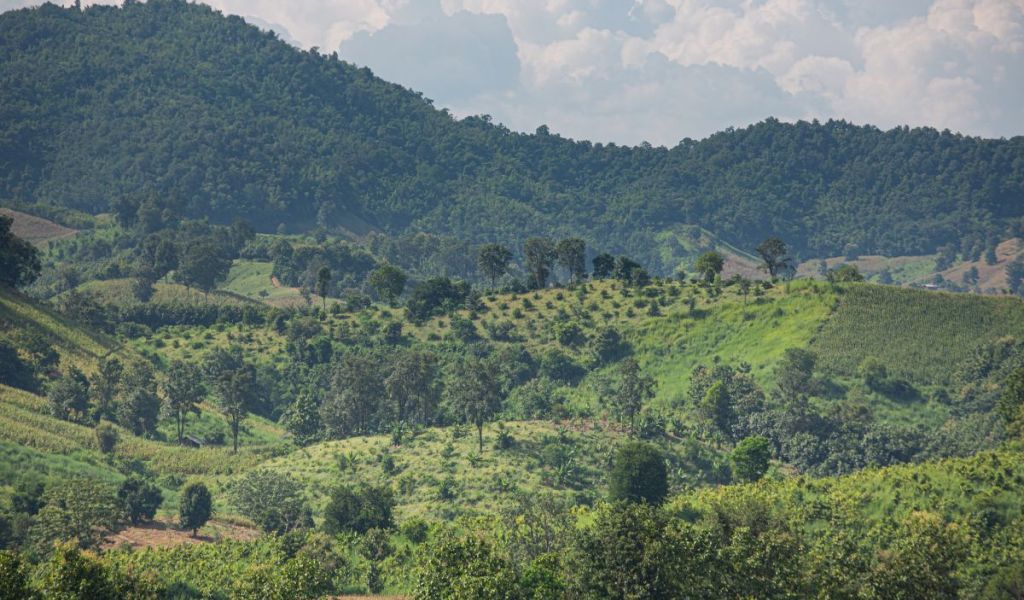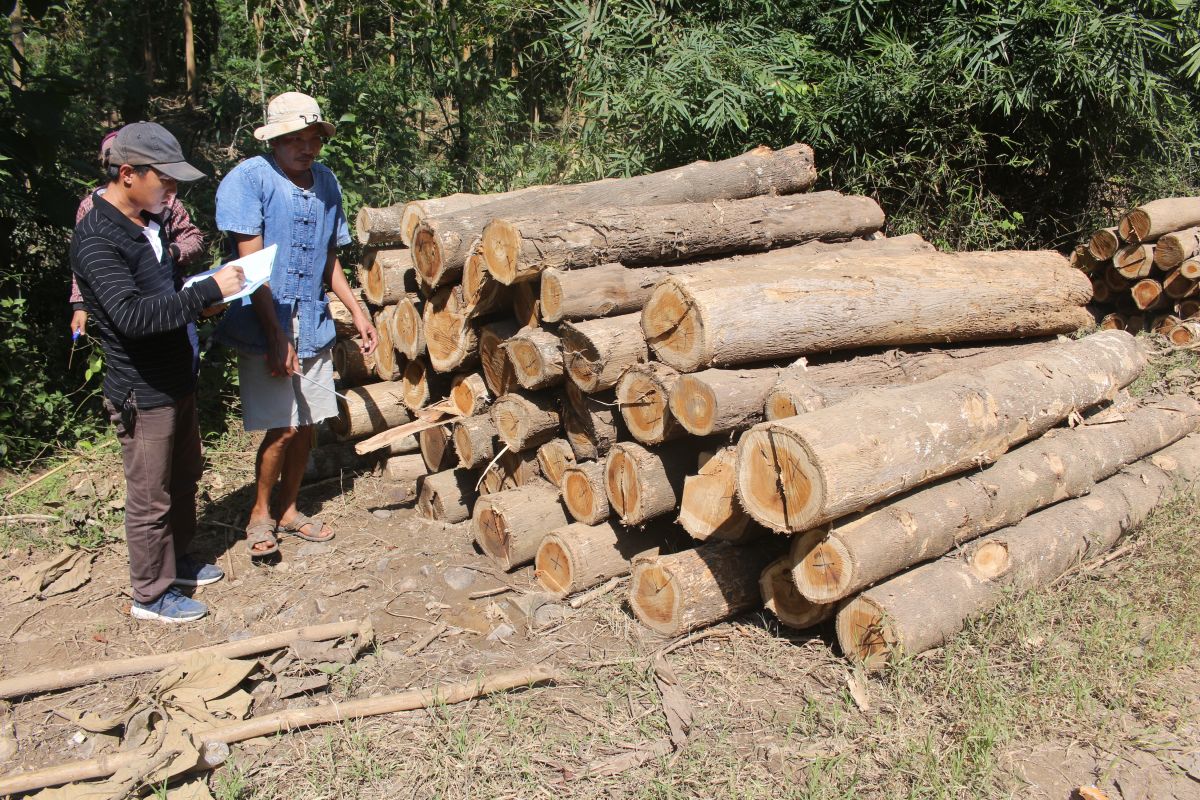What the EU regulation for deforestation-free products means for communities and smallholders in Asia

In December 2022, the EU agreed to adopt a landmark regulation on deforestation-free products. It will require companies in the EU to use a due diligence process to ensure that certain commodities and derived products entering or leaving the EU market are legal and are from land that has not been deforested since 31 December 2020.
The regulation will cover key globally traded commodities such as coffee, cocoa, rubber, soy, cattle, timber and palm oil, and derivatives including beef, chocolate, furniture and paper. The expansion of agriculture to produce these commodities is responsible for 90 percent of deforestation. The EU itself accounts for 16 percent of the tropical deforestation associated with international commodity trade, second only to China. By implementing the regulation, the EU hopes to reduce its contribution to global environmental crises and assure consumers that the products they buy are legal and sustainable.
This new approach is commendable. It is the first with a global reach that addresses both legality and sustainability of products driving deforestation. This is a major step towards limiting biodiversity loss and climate change by protecting forests and the crucial roles they play. But civil society groups and some governments have raised concerns about the regulation’s potential negative impacts, particularly on smallholders and local communities, and the feasibility of certain aspects of its implementation. The regulation is set to be adopted and enter into force by mid-2023. It is crucial now to raise awareness among all actors of the potential impacts, and proactively address and minimize them.
Protecting the rights of Indigenous Peoples and local communities
From palm oil in Indonesia to coffee in Lao PDR, the production of certain commodities has a track record of creating human rights abuses. These include land grabbing, dispossession and violence. There are also issues around transparency and benefit sharing. Governments in commodity-producing countries, businesses and the EU must address these issues and implement safeguards to avoid abuses.
Reflecting this, the EU regulation highlights the need to protect local people’s rights and recognizes their roles as forest protectors and managers. It also refers to the rights of Indigenous Peoples to be consulted to obtain their free, prior and informed consent for projects affecting their lands, territories and resources, as enshrined in international agreements.
But in practice, the protection of communities’ rights will be left to national standards that vary greatly. This is because the regulation relies on the national laws of producer countries. For example, free, prior and informed consent processes will only be required where a national law makes this an obligation. This means that in countries with weak laws, local people may lack protection. And in the context of the new regulation, it means that commodities whose production has harmed local people could still be considered legal.
Proving legality when land tenure is insecure
The regulation also has implications for the millions of smallholders producing agricultural commodities. Smallholders produce 95 percent of coffee in Viet Nam, 42 percent of palm oil in Indonesia and 95 percent of rubber in Thailand. The EU is a major market for their products. But one challenge many smallholders will now face to access that market is assuring buyers that they have produced commodities legally.
Recent surveys in Indonesia found, for example, that less than two percent of smallholders growing oil palm had plantation-registration certificates. In Thailand, most rubber is produced by smallholders who harvest it on public land, over which they have land use rights. Under Thailand’s Kor Tor Chor policy on land tenure, these smallholders must have a land certificate to attest to these rights. But too often and more broadly in Asia, authorities are slow to issue these documents.
Many smallholders in other countries also lack the necessary paperwork. By operating without such administrative requirements, they will struggle to meet the legal standards required in due diligence processes under the EU regulation. Governments in producer countries must strengthen and properly implement legal frameworks on land and resource tenure to ensure that commodities are legally produced.
Another issue is that many smallholders practise agroforestry, growing a mix of trees and crops, including commodities covered by the EU regulation. Agroforestry has been widely encouraged for providing multiple income streams, protecting biodiversity and increasing carbon storage on farmland. But acceptable agroforestry practices in respective countries could be considered non-compliant when the regulation is enforced. Smallholders currently accessing EU markets for sustainably managed products could be shut out.
The costs and complexity of ensuring traceability
The new regulation will require EU companies to make changes that will affect their supply chain partners. Companies at all levels of commodity supply chains will need to adapt. But for smallholders, who typically manage no more than two hectares of land, the costs of adapting to new systems and practices would put an unfair burden on them.
For example, the regulation’s requirements for traceability, and for geolocation of all plots of land where commodities were produced, will require companies to change their systems and processes. Smallholders will need support to understand and adapt to the new requirements. These include collecting a range of data and information to prove legal and sustainable sourcing. They will need tools specifically designed for them, and enhanced skills to help them identify different pathways to producing legal and sustainable products. One such tool that RECOFTC developed to promote certification of smallholder timber producers can be adapted for the requirements of the new EU regulation.
The experiences of smallholders in achieving timber legality, whether through certification or by following a national timber legality verification system, as in Indonesia, have shown the complexity of traceability systems and the obstacles smallholders face. Past experiences and capacities built, such as through Voluntary Partnership Agreement processes under the EU Forest Law Enforcement, Governance and Trade (FLEGT) Action Plan, also offer valuable lessons for developing and implementing realistic traceability systems.
Buyers that deal with many smallholders over large areas may find the costs of compliance with the new EU regulation too high. Similar costs have previously resulted in companies cutting loose their smallholder suppliers. For example, the Indonesian Sustainable Palm Oil sustainability certification scheme led at least one large multinational company to stop sourcing palm oil from smallholders and instead work with larger suppliers.
The importance of smallholders should not be underestimated. Investing in their capacities to closely align with supply chain operations and reduce additional compliance costs can pay off for companies.
Building equitable business models
Pathways towards compliance for smallholders should include tailored capacity-strengthening programs, such as partnership building. RECOFTC’s experience in the forest sector has taught us that building capacity involves the exchange of ideas and expertise among different stakeholders who depend on each other in legally and sustainably managing forest and land resources.
In Lao PDR for example, timber contracts between a sawmill and two teak-producing communities have been successfully operational for the past three years based on a process of capacity building and partnership brokering. Developing equitable business models based on the needs and requirements of the different supply chain actors can provide sustainable, legal and conflict-free commodities. Scaling up the issuance of plantation certificates to teak smallholders with mature timber to sell was critical to this success.
For continual access to markets, smallholders elsewhere can benefit from partnering with companies that rely on their commodities as raw materials. Communities and smallholders organized as cooperatives or other producer groups are more attractive to such companies and are better able to negotiate prices and business agreements with buyers.
Landscape approaches, participatory decision-making and good governance
Landscape or jurisdictional approaches can help tackle some of the potential risks highlighted above. RECOFTC’s inclusive, long-term, landscape-based approach supports local communities, civil society, local governments and the private sector to find common solutions and adopt improved practices to transition towards sustainable supply chains of commodities. This helps build trust, avoid conflicts and has the potential for substantial change over time without creating silos or adverse impacts found in other sectoral approaches.

Overall, in terms of governance and when developing responses to the EU regulation, it is important to use and build on transparent, multi-stakeholder approaches, such as the decision-making platforms used in the FLEGT Voluntary Partnership Agreement processes. Governance reforms should be developed consultatively by experienced actors, including representatives of communities and smallholders.
The regulation should be accompanied in commodity-producing countries by national participatory legal reforms, community-based monitoring mechanisms and appropriate grievance systems. Civil society must have a strong hand in helping design and implement these processes, including through independent monitoring. These are all areas in which RECOFTC continues to build on our experience and leverage our networks. In particular, we facilitate multi-stakeholder and multi-sector dialogues, and build the capacities of civil society groups to work with other actors to promote good forest governance.
Looking ahead
Much preparation for and implementation of the new regulation will be undertaken in the next two years. But considerable uncertainty remains. If the regulation does not call on producer-countries to establish overall human rights standards, or clearly define terms and specific applications on deforestation, this might lead companies to source products from regions or countries with weaker legal and policy frameworks. This could lead to exploitation, and less sustainable and ethical sourcing of products, undermining the EU’s intention.
But the regulation also has the potential to create incentives for countries to adapt their policies or legislation to tackle deforestation. To be effective, reforms must reflect realities on the ground and address the concerns of smallholders, Indigenous Peoples and local communities.
To avoid potential risks, strengthen overall outcomes and best serve the interests of stakeholders, remaining decision-making processes in both producer countries and the EU should be as inclusive as possible. The EU should also establish clear mechanisms for monitoring the regulation’s implementation so that its impacts can be understood and addressed. RECOFTC is committed to supporting smallholders, communities and stakeholders in Southeast Asia and the EU in these efforts.
Read more about the regulation in the European Commission’s press release

